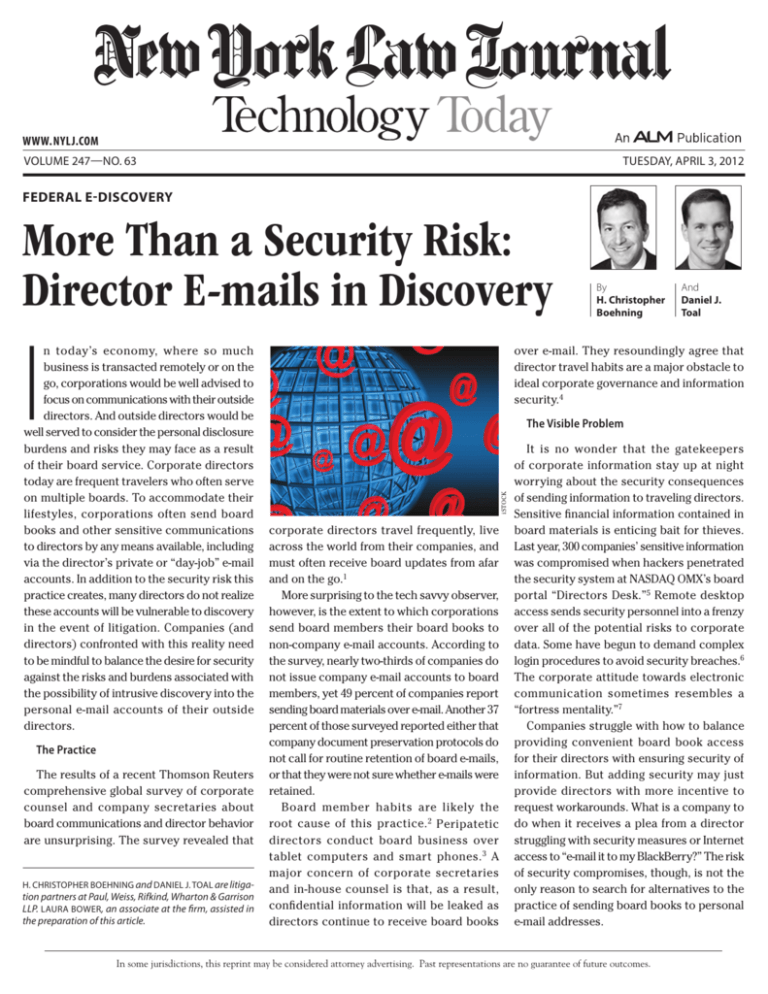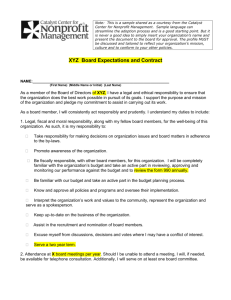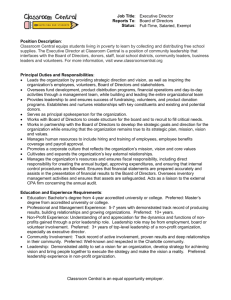
www. NYLJ.com
tuesday, april 3, 2012
Volume 247—NO. 63
Federal e-discovery
More Than a Security Risk:
Director E-mails in Discovery
I
The Practice
The results of a recent Thomson Reuters
comprehensive global survey of corporate
counsel and company secretaries about
board communications and director behavior
are unsurprising. The survey revealed that
H. Christopher Boehning and Daniel J. Toal are litigation partners at Paul, Weiss, Rifkind, Wharton & Garrison
LLP. Laura Bower, an associate at the firm, assisted in
the preparation of this article.
And
Daniel J.
Toal
over e-mail. They resoundingly agree that
director travel habits are a major obstacle to
ideal corporate governance and information
security.4
The Visible Problem
istock
n today’s economy, where so much
business is transacted remotely or on the
go, corporations would be well advised to
focus on communications with their outside
directors. And outside directors would be
well served to consider the personal disclosure
burdens and risks they may face as a result
of their board service. Corporate directors
today are frequent travelers who often serve
on multiple boards. To accommodate their
lifestyles, corporations often send board
books and other sensitive communications
to directors by any means available, including
via the director’s private or “day-job” e-mail
accounts. In addition to the security risk this
practice creates, many directors do not realize
these accounts will be vulnerable to discovery
in the event of litigation. Companies (and
directors) confronted with this reality need
to be mindful to balance the desire for security
against the risks and burdens associated with
the possibility of intrusive discovery into the
personal e-mail accounts of their outside
directors.
By
H. Christopher
Boehning
corporate directors travel frequently, live
across the world from their companies, and
must often receive board updates from afar
and on the go.1
More surprising to the tech savvy observer,
however, is the extent to which corporations
send board members their board books to
non-company e-mail accounts. According to
the survey, nearly two-thirds of companies do
not issue company e-mail accounts to board
members, yet 49 percent of companies report
sending board materials over e-mail. Another 37
percent of those surveyed reported either that
company document preservation protocols do
not call for routine retention of board e-mails,
or that they were not sure whether e-mails were
retained.
Board member habits are likely the
root cause of this practice. 2 Peripatetic
directors conduct board business over
tablet computers and smart phones. 3 A
major concern of corporate secretaries
and in-house counsel is that, as a result,
confidential information will be leaked as
directors continue to receive board books
It is no wonder that the gatekeepers
of corporate information stay up at night
worrying about the security consequences
of sending information to traveling directors.
Sensitive financial information contained in
board materials is enticing bait for thieves.
Last year, 300 companies’ sensitive information
was compromised when hackers penetrated
the security system at NASDAQ OMX’s board
portal “Directors Desk.”5 Remote desktop
access sends security personnel into a frenzy
over all of the potential risks to corporate
data. Some have begun to demand complex
login procedures to avoid security breaches.6
The corporate attitude towards electronic
communication sometimes resembles a
“fortress mentality.”7
Companies struggle with how to balance
providing convenient board book access
for their directors with ensuring security of
information. But adding security may just
provide directors with more incentive to
request workarounds. What is a company to
do when it receives a plea from a director
struggling with security measures or Internet
access to “e-mail it to my BlackBerry?” The risk
of security compromises, though, is not the
only reason to search for alternatives to the
practice of sending board books to personal
e-mail addresses.
In some jurisdictions, this reprint may be considered attorney advertising. Past representations are no guarantee of future outcomes.
tuesday, april 3, 2012
The Unforeseen Problem
An often unanticipated and always
unfortunate consequence of e-mailing
board books is that board members may be
subjecting themselves to invasive searches
of their private files and e-mails if litigation
erupts.8 Many outside counsel have had
awkward conversations with directors about
the need to search their home files and private
e-mail accounts.
While this is not uniquely a Delaware
phenomenon, Delaware law on this subject
is noteworthy both because of the frequency
with which companies incorporate in Delaware
and because Delaware courts have made
their position on director e-discovery clear.
The Delaware Court of Chancery issued
guidelines on best e-discovery practices
last year. These guidelines are designed to
“remind all counsel…of their common law duty
to their clients and the Court with respect
to the preservation of electronically stored
information (‘ESI’) in litigation.”9
Experience has shown that some of
the potential problem areas regarding
preservation of ESI include business laptop
computers, home computers (desktops
and laptops), external or portable storage
devices such as USB flash drives (also
known as thumb or key drives) and
personal e-mail accounts.
Delaware courts do not take this duty lightly.
In 2009, Chancellor William B. Chandler III ruled
on a motion to compel in Grace Brothers v.
Siena Holdings.10 Grace Brothers filed the
motion to force Siena to produce e-mails sent
to and from the board of directors, most of
whom received board e-mails via their private
accounts. Grace Brothers responded that the
e-mails would be wholly duplicative of e-mails
already in the production.
Chandler was distrustful of defense
counsel’s assertion that there would be no
unique e-mails because “Siena failed to even
ask that the directors look for any relevant
e-mails in their accounts.” The court held that
it would not be overly burdensome to require
Siena’s directors to produce e-mails from their
personal accounts, despite the risk that very
little new information would be gained by a
search of private e-mails, and granted Grace
Brothers’ motion.
This risk of finding unique e-mails seems
particularly acute in light of the above statistic
noting that many companies do not routinely
retain e-mails to directors. At those companies,
a director’s personal e-mail account may very
well be the only place those communications
will be available.
Vice Chancellor J. Travis Laster went a
step further in Roffe v. Eagle Rock Energy.11
In response to plaintiff’s discovery requests,
counsel to Eagle Rock asked board members
where they stored communications from the
company. The directors assured counsel
that they had diligently saved each e-mail in
a folder designated for board communications
and forwarded the contents of the folder for
production. Finding this insufficient, the court
scolded the attorneys for failing to supervise
these e-mail searches personally:
An often unanticipated consequence
of e-mailing board books is that board
members may be subjecting themselves
to invasive searches of their private files
and e-mails if litigation erupts.
And if he chose to use his personal
computer, well, that was his bad choice. All
right? And if he has it mixed in other stuff
that he gets, 150 e-mails a day, or whatever,
that was his bad choice. That makes it
all the more essential that a lawyer get
on a plane, and go and sit down with Mr.
Smith, and go through his e-mail and make
sure that what is produced is—what is
responsive is appropriately produced.
These attorneys were then faced with the
awkward task of explaining to the directors
why they would need to be visiting them at
home. Delaware Courts have ordered and likely
will continue to order discovery of directors’
personal e-mail accounts when they are used
for company business.
As they often do, other jurisdictions are
likely to follow Delaware. The U.S. District
Court for the Southern District of New York has
held that work-related documents and e-mails
in the possession of an employee are under
the control of the employer and therefore
discoverable. In fact, federal courts have ruled
that corporations must ask former employees
for documents in their private possession that
may be discoverable.12
Solutions
Corporations must find a way to protect the
security of their sensitive financial information
while still facilitating communications with
directors who must execute fiduciary duties in a
timely fashion while on the road. In order
to protect directors from discovery of their
personal accounts and computers, the
proper tool will need to have the following
features:
• A way to alert a director when important
information is available without revealing
sensitive content about the information;
• The ability to access and edit documents
without saving them locally to a laptop
or tablet;
• Emergency access to board materials on
a device (such as a smart phone) when no
computer access is available to the director
that will not make the other contents of the
device discoverable; and
• Easy but secure remote access for a director
who does not use the program every day.
A few solutions have been proposed.
Commentators have suggested that boardpacks be sent exclusively over highly secure
company issued e-mail accounts to minimize
risk of hacking.13 If executed perfectly, this
would also protect director e-mail accounts.
Unfortunately perfect execution eludes
directors. The average director of a public
company holds three directorships (and a
job) but prefers to operate from one account
that is programmed to “ding” the smart
phone.14 In addition, security measures may
lock directors out of seldom used company
accounts. Evidence has shown that, when
work e-mail is creating delays, executives often
resort to personal e-mail accounts for business
purposes. 15 Directors do the same. Finally,
documents downloaded onto a director’s own
computer from these e-mail accounts may
make the contents of the director’s computer
discoverable.
Another method companies increasingly use
to combat the security risks created by mobile
directors is the “board portal.” A board portal
is an online workspace designed to give remote,
secure access to confidential information to
board members.16 The corporate secretaries
upload the information to a secure portal that
directors then access remotely. Increasingly,
board portals are adapting their technology to
accommodate the needs of directors without
wednesday, JAnuary 11, 2012
compromising security.17 Unfortunately, board
portals have yet to strike the perfect balance.18
Complex security measures and multiple
passwords (as well as multiple logins for
directors who serve several boards) frustrate
the purpose of the portals because impatient
directors bypass the security measures.19 For
any platform to work, directors must embrace
it. At present, as noted above, board portals
are too attractive to hackers to loosen security
measures to facilitate ease of access.
Some companies have created home
grown portal-like methods for disseminating
encrypted information. Instead of e-mailing the
director, the corporation sends the information
directly to the director’s tablet using a secure
application. The downside is that to edit
documents, the director must save them
locally. Litigants will request the annotated
versions so the contents of the tablet will still
need to be harvested, read, and produced.
An ideal solution may involve a hub where a
director can direct the flow of all information
she receives from the different boards she
serves. The “directornet” could issue the
director a smart phone and/or a tablet to
use exclusively for board purposes or carve
out isolated space on the director’s existing
devices for each board. The director would
only need one set of log-in data that she would
use almost daily.
Conclusion
Regardless of the method chosen,
corporations would be well advised to closely
consider the risks of continuing the practice of
sending e-mail board books to their directors.
A director, like many of those in the Thomson
Reuters survey, whose company will not pay
for a portal or a company e-mail account,
still has options. Companies should be more
assertive in taking steps to ensure that board
book materials are transported and stored in a
safer environment. Companies should establish
and require compliance with best practices
for storage of materials, e.g., saving into a
dedicated, password protected folder on a hard
drive. And companies should educate directors
of the risks they face in the event they seek to
avoid these policies. Absent a better alternative,
a director should set up an e-mail account
to use exclusively for board business. Since
such a director will be helpless to protect the
security of sensitive information, at minimum
the director can protect her personal data and
her home company’s data by maintaining strict
separation between board and personal or
work e-mails.
Kimberly
Allan,
Better
Board
341 (S.D.N.Y. 2005).
13. John Steven & Hilary Kincaid, “Are electronicallydelivered board packs a good idea?,” Minter Ellison Corporate
HQ Advisory, Sept. 12, 2011.
••••••••••••••••
•••••••••••••
1.
Export-Import Bank of U.S. v. Asia Pulp & Paper, 233 F.R.D. 338,
14. Christa Bouwman, Overlapping Boards of Directors:
Governance:
Causes and Consequences for Corporate Governance,
Communications, Security, and Technology in a Global
Financial Contagion: The Viral Threat to the Wealth of Nations,
Landscape of Change: Results of the 2011 Thomson Reuters
John Wiley & Sons, Feb. 2011.
Board Governance Survey, 4 (Thomson Reuters 2011).
2. John Steven & Hilary Kincaid, “Are electronicallydelivered board packs a good idea?,” Minter Ellison Corporate
HQ Advisory, Sept. 12, 2011.
15. Ian Grant, “Bosses are the biggest threat to corporate
data…,” Computer Weekly, Aug. 10, 2010.
16. Bader & Associates, Great Boards Buyer’s Guide to
Board Portals, 2009.
3. London Stock Exchange, “BoardVantage Announces iPad
17. For example, industry leaders are increasingly providing
Briefcase,” London Stock Exchange Aggregated Regulatory
smart phone and tablet applications that attempt to isolate
News Service, Jan. 28, 2011.
board communications from other e-mails and the rest of the
4. Allan, supra note 1, at 10.
director’s computer. See, e.g., BoardVantage, Security, http://
5. Dominic Jones, “NASDAQ hack targets Fortune 500 board
www.boardvantage.com/security (last visited March 26, 2012);
secrets,” IR Web Report, Feb. 6, 2011, http://irwebreport.
The Four Key Requirements of a Board Portal, Boardbooks,
com/20110206/directors-desk-hacked/.
available at http://www.boardbooks.com/diligentbooks/board-
6. See, e.g., Mathias Thurman, “Security Manager’s Journal:
First task is to tighten up SaaS security,” Computerworld, Dec.
6,
2010,
http://www.computerworld.com/s/article/352873/
Tightening_Up_SaaS_Security.
portal-requirements.shtml.
18. Id.
19. Matt Perkins, “Board Portals: No Assembly Required,”
Directorship, April 22, 2008.
7. James Brashear et al., “Mastering New Technologies
for Boards and Corporate Secretaries,” Society of Corporate
Secretaries & Governance Professionals, Oct. 17, 2011.
8. While the focus of this article is director discovery, it is
worth mentioning that directors are not the only employees
who bear discovery risk when using home accounts and
devices for work purposes. For example, in Koosharem v.
Spec Personnel, Magistrate Judge William Catoe ordered
eight employees who had used their personal accounts and
computers for work purposes to “turn over their home and
work computers to a third party for forensic analysis.” 2008
WL 4458864 (D.S.C., 2008). The government has also sought
discovery into private e-mail accounts used to send work
information, including “diaries” employees keep by sending
e-mails to themselves. See, e.g., The Financial Crisis Inquiry
Commission, “Early 2007: Spreading Subprime Worries,” The
Financial Crisis Inquiry Report 238-39 (2011) (quoting e-mails
sent by Bear Stearns employees from personal e-mail accounts
concerning the financial crisis).
9. Delaware Court of Chancery, Court of Chancery Guidelines
for Preservation of Electronically Stored Information, Jan
18,
2011,
http://courts.delaware.gov/forms/download.
aspx?id=50988.
10. C.A. No. 184-CC (Del. Ch. June 2, 2009) (Memorandum
Opinion).
11. C.A. No. 5258-VCL (Del. Ch. April 8, 2010) (Telephone
Conference Transcript).
12. Chevron v. Salazar, 11 Civ. 3718 (S.D.N.Y. Aug. 3, 2011)
(Memorandum and Order) (citing Caston v. Hoaglin, No. 2:08CV-200, 2009 WL 1687927, at *3 (S.D. Ohio June 12, 2009));
Reprinted with permission from the April 3, 2012 edition of the
NEW YORK LAW JOURNAL © 2012 ALM Media Properties,
LLC. All rights reserved. Further duplication without permission
is prohibited. For information, contact 877-257-3382 or reprints@
alm.com. # 070-04-12-04









